Right!
Jerome; Prefaces to the Vulgate Version of the Old Testament;
Proverbs, Ecclesiastes, and the Song of Songs
As, then, the Church reads Judith, Tobit, and the books of Maccabees, but does not admit them among the canonical Scriptures, so let it read these two volumes for the edification of the people, not to give authority to doctrines of the Church.
(from Nicene and Post-Nicene Fathers, Series 2, Volume 6, PC Study Bible formatted electronic database Copyright © 2003, 2006 by Biblesoft, Inc. All rights reserved.)
Book Two
33. In reference to Daniel my answer will be that I did not say that he was not a prophet; on the contrary, I confessed in the very beginning of the Preface that he was a prophet. But I wished to show what was the opinion upheld by the Jews; and what were the arguments on which they relied for its proof. I also told the reader that the version read in the Christian churches was not that of the Septuagint translators but that of Theodotion. It is true, I said that the Septuagint version was in this book very different from the original, and that it was condemned by the right judgment of the churches of Christ; but the fault was not mine who only stated the fact, but that of those who read the version. We have four versions to choose from: those of Aquila, Symmachus, the Seventy, and Theodotion. The churches choose to read Daniel in the version of Theodotion. What sin have I committed in following the judgment of the churches? But when I repeat what the Jews say against the Story of Susanna and the Hymn of the Three Children, and the fables of Bel and the Dragon, which are not contained in the Hebrew Bible, the man who makes this a charge against me proves himself to be a fool and a slanderer; for I explained not what I thought but what they commonly say against us. I did not reply to their opinion in the Preface, because I was studying brevity, and feared that I should seem to he writing not a Preface but a book. I said therefore, "As to which this is not the time to enter into discussion." Otherwise from the fact that I stated that Porphyry had said many things against this prophet, and called, as witnesses of this, Methodius, Eusebius, and Apollinarius, who have replied to his folly in many thousand lines, it will be in his power to accuse me for not baring written in my Preface against the books of Porphyry. If there is any one who pays attention to silly things like this, I must tell him loudly and free that no one is compelled to read what he does not want; that I wrote for those who asked me, not for those who would scorn me, for the grateful not the carping, for the earnest not the indifferent. Still, I wonder that a man should read the version of Theodotion the heretic and judaizer, and should scorn that of a Christian, simple and sinful though he may be.
(from Nicene and Post-Nicene Fathers, Series 2, Volume 3, PC Study Bible formatted electronic database Copyright © 2003, 2006 by Biblesoft, Inc. All rights reserved.)
He never makes the assertion your trying to make. And notice he repeatedly says 'churches', 'christian churches', 'churches of Christ'? Never does he suggest he is following any church based in rome or under some direction of a pope. And the translation of Daniel they were reading was of a person Jerome calls a heretic and judaizer. If thats your best evidence Jerome accepted the apocrypha, i'd keep looking.


